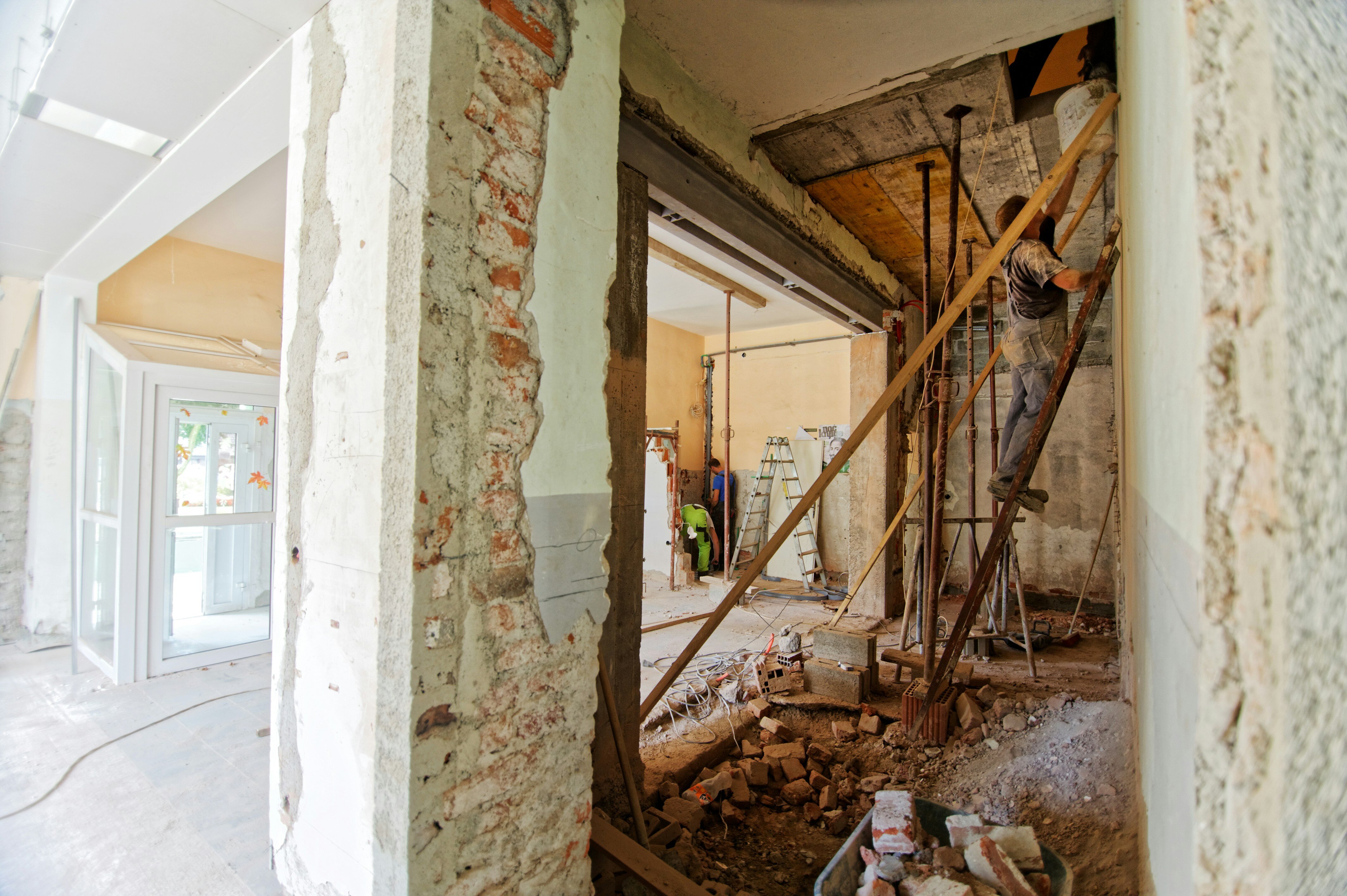Selling a house in Texas can be quite challenging, especially when legal matters come into play. Enhancing your home with value-boosting upgrades is a great strategy to attract buyers, but it’s important to remember that some renovations require permits.
Overlooking this step can complicate selling a house with unpermitted work and impact the buyer’s ability to secure financing.
Even if the unpermitted work was done before you owned the house, failing to disclose it can lead to legal issues if the buyers discover it later.
However, there’s no need to panic—unpermitted work is a common issue, and there are ways to address it effectively.
Understanding Unpermitted Work

Unpermitted work refers to any construction or renovation done without the necessary legal building permits. This often includes projects like home additions or finishing a basement.
Whether you’re buying or selling, unpermitted work can be a costly and time-consuming issue. In Texas, where homeowners take great pride in their properties, unpermitted work can be particularly troublesome. It’s crucial to address these issues promptly to avoid complications and ensure everything is up to code.
Common Types of Unpermitted Work in Texas
In Texas, several common types of home improvements and building work often get done without the necessary permits.
These include re-roofing, where homeowners replace or add new roofing materials; plumbing additions, such as installing new bathroom fixtures or extending water lines; and building new pools, which involve extensive excavation and water systems.
Garage conversions are also frequent culprits, as homeowners transform garages into living spaces or extra rooms without seeking approval.
While these projects can enhance a home’s value and functionality, failing to get the proper permits can lead to significant issues down the line, including fines and difficulties when it’s time to sell.
Risks and Consequences
There are also safety concerns to consider. Unpermitted work may not comply with local building codes, which can pose significant risks to the occupants.
This non-compliance can also affect the seller’s ability to get insurance, as insurance companies might refuse coverage if the property is deemed unsafe or fails to meet local regulations.
So basically, unpermitted work can lead to various complications that make selling and insuring a home much more challenging.
Moreover, Unpermitted work can create significant legal and safety issues.
Without the proper permits, there’s no assurance that the work was done correctly or in compliance with building codes and local ordinances.
This lack of oversight can lead to serious safety hazards for current and future occupants, increasing the risk of accidents or structural failures.
Legal Requirements and Texas Disclosure Laws
According to Texas disclosure laws, sellers are legally required to disclose any known issues with their property, including unpermitted work.
If you fail to disclose unpermitted work done by previous owners, you could face serious legal consequences. Disclosing unpermitted work can make selling a home much more difficult.
Buyers are often wary of properties with unpermitted work due to the potential costs and hassle of bringing everything up to code, which can result in lower offers or a reduced number of interested buyers.
Additionally, many lenders hesitate to finance homes with unpermitted work, further shrinking the pool of potential buyers.
Consequences of Non-Disclosure
Potential Legal Action
Should the buyer discover the unpermitted work after the sale, they might have grounds to sue you for not providing full disclosure. This can lead to costly legal battles and potential financial liabilities.
Ensuring all work on your property is permitted and fully disclosed not only helps maintain transparency but also protects you from future legal issues.
Financing Challenges
When buyers apply for financing, lenders typically require appraisals and inspections.
Unpermitted work can trigger concerns during these assessments, potentially jeopardizing loan approval.
Lenders prioritize the property’s value and safety, and the presence of unpermitted work can make them hesitant to finance the purchase.
Options for Addressing Unpermitted Work
Rescind the Purchase
If you have a partially finished basement with unpermitted work, you might highlight the property as having “great potential.”
This can turn the unpermitted improvements into a positive, appealing to buyers who can envision their own plans for the space.
Offering a discount on the purchase price can help offset the costs of bringing the work up to code, or you might provide the option for buyers to back out before closing if they choose.
This way, buyers feel like they’re getting a deal, and you avoid spending time and money on the repairs. Plus, it helps protect you from future liability related to the unpermitted work.
Legal Action Against Previous Owners
If the unpermitted work was done by a previous owner, you have the option to sue them for it. This could lead to a long legal battle which is often something home owners try to avoid, but in such cases it may be necessary.
Remediating Unpermitted Work
Removing or remediating unpermitted work can vary widely in cost, depending on the project’s scope and the extent of the necessary corrections.
While this might be a significant expense, bringing the work up to code can ultimately increase the home’s value, help avoid future liabilities, and make the selling process smoother.
Homeowners typically need to hire a licensed contractor to correct or replace the unpermitted construction.
If you’re planning to sell soon and want to avoid high costs, be cautious with DIY remediation efforts. Attempting to fix the issues yourself might inadvertently create more unpermitted work, complicating the situation further.
Obtaining a Retroactive Permit
If unpermitted work was done recently, it’s worth checking with your local building or planning department to see if a retroactive permit is an option.
Typically, cities require visibility of all aspects of the work to ensure it meets code, and inspectors won’t tear into walls or remove flooring to verify it.
Obtaining retroactive permits is generally more expensive than getting permits before starting construction.
The higher fees are designed to discourage unpermitted work and fund the city’s efforts to address such issues.
When considering applying for a retroactive permit , it’s a good idea to consult a reputable contractor.
They can assess the previous work, estimate the cost of bringing it up to code, and identify which parts already comply. This preparation can help streamline the retroactive permitting process.
Selling a House with Unpermitted Work

Selling “As Is”
If dealing with unpermitted work sounds overwhelming, you might consider selling your house “as-is.” This means the buyer will purchase the home without requiring you to make any repairs.
Real estate agents often use this term for homes that haven’t been updated recently or need repairs.
However, selling as-is can present challenges. Depending on the extent of the unpermitted work, buyers might face financing issues with their lenders due to code violations.
If you decide to go this route, be sure to provide full disclosure about the unpermitted work to avoid any future legal complications.
Getting a Retroactive Permit
Applying for a retroactive building permit is similar to a regular permit, as it ensures that the work meets current codes. You’ll need clear drawings and supporting documents like site plans and structural calculations.
Tracking down the original builder might help, as cities often keep records of past permits. While the process can be complex and pricey, it might be your best option in certain situations as it can help improve buyer confidence and sale value.
Selling to an Investor
Selling your house to real estate investors can be a viable alternative, especially if dealing with unpermitted work feels overwhelming. This option offers several benefits, especially if you’re dealing with unpermitted work.
Investors buy properties as-is, saving you time and stress. They have the resources to handle unpermitted work and can make fair offers despite these issues. Investors also close deals quickly, providing a convenient and efficient solution for selling your property.
Tips for Selling a House with Unpermitted Work
Transparency
When selling a house with unpermitted work, being transparent is crucial. It’s essential to be upfront and honest with potential buyers about any unpermitted improvements or renovations. This transparency builds trust and sets the stage for a smoother transaction.
Getting an Appraisal
Getting an appraisal from a professional is another important step in the process. This assessment provides an estimate of the repair costs associated with the unpermitted work, giving both you and the buyer a clearer understanding of the financial implications involved.
Offering Repair Contingency
Offering a repair contingency can also help ease buyers’ concerns. This agreement demonstrates your willingness to cover the repair costs post-sale, providing reassurance and peace of mind to potential buyers.
Highlighting Other Property Features
Emphasizing the unique selling points, such as a desirable location, spacious layout, or beautiful landscaping, can help draw attention away from any concerns buyers may have and showcase the property’s overall market value and appeal.
By focusing on these aspects, you can attract interested buyers and increase the likelihood of a successful sale.
Texas Home Improvement Permit Laws

Permit Requirements
When you’re making significant changes to your property, like building, remodeling, or expanding a building, you’ll typically need permits.
It’s important to get these permits because unpermitted work can cause issues when it’s time to sell your property.
Not only can it lead to legal problems, but it can also raise safety concerns. So, while it might seem like a hassle to get permits, it’s a step that can save you a lot of trouble in the long run.
Types of Projects Requiring Permits
You will need permits for the following projects:
- Construction of a building
- Building or replacing accessory structures (sheds, gazebos, carports)
- Foundation repairs
- Additions to a building
- Remodeling that involves adding or removing walls or enlarging openings
- Building or replacing a deck over 30″ above ground
- Electrical work (except for basic repairs like switches or plugs)
- Plumbing work, including water heaters and sewer lines
- Installation or replacement of irrigation systems
- Installing or replacing a furnace or air conditioning system
- Building or replacing a fence or retaining wall over 4 feet tall
- Roof replacement
- Installing or replacing a driveway approach or circular drive
- Building a swimming pool or spa
- Demolition of a building
These permits are also necessary for other major improvements, but for smaller cosmetic projects like painting, putting up wallpaper, installing carpet, cabinets, etc., you usually don’t need permits.
Consequences of Non-Compliance
Not following building permits can lead to serious consequences. It’s not just about following rules—it’s about protecting yourself legally and financially.
By ignoring building codes, you risk facing legal and financial repercussions down the line. These can include fines, penalties, and even lawsuits if the work causes damage or injury.
Adhering to local building codes is crucial. They’re in place to ensure structures are safe and meet certain standards.
By complying with these codes and getting the necessary permits, you’re not only avoiding trouble but also ensuring the safety and integrity of your property. It’s about doing things right and protecting yourself and others in the process.
Final Thoughts
If you consider selling a house for cash with unpermitted work as-is might seem daunting, but it’s definitely doable. By grasping the implications, evaluating the situation, and taking the appropriate actions, you can navigate this process successfully.
Whether you opt to fix the issues, sell without making repairs, negotiate with potential buyers, or adjust the price accordingly, transparency and collaboration are key to a positive outcome.
It’s essential to seek guidance from professionals like real estate agents and inspectors to steer you through the process and ensure a seamless sale. With the right approach, you can sell your property with confidence and move forward smoothly.

Zach Shelley
Zach Shelley is a seasoned real estate investor with a diverse network spanning across the nation. As the founder of his own real estate venture, Zach is committed to offering innovative solutions to homeowners facing various real estate challenges.. Through his dedication and strategic approach, Zach continues to make a significant impact in the real estate industry, providing homeowners with alternative pathways to navigate their property transactions.



